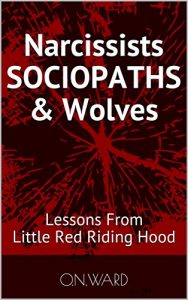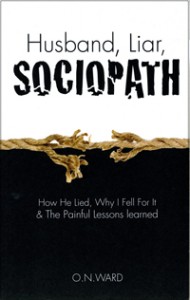You’re too sensitive!
As I think back about my life and my unwitting marriage to a sociopath, a phrase haunts and repeats like an old-time broken record, “You’re too sensitive.”
For decades, I believed that hearing this phrase should trigger self-reflection and attempts at self-improvement. If I’m “too sensitive,” the underlying assumption is that I should work to become “less sensitive.” I believed this because this is what I’d been taught as a child, and it was reinforced through my adult life by two people I loved and respected at the time—my father and my now ex-husband. Yet, now I believe that hearing this phrase repeatedly by key people in one’s life should trigger another type of self-improvement—better understanding the red flags of being in a relationship with a narcissist or sociopath, and establishing appropriate relationship boundaries.
We are born with different levels of “sensitivity” to external stimulation
There are many valid reasons for someone to have heightened sensitivity compared to others. Children are born with a range of sensitivities to external stimulation. Research shows that introverts actually react more strongly than extroverts to external stimuli such as pain and even smells and tastes.
Trauma often results in heightened sensitivity
In addition, people who have been traumatized are more likely to be hyper vigilant and to detect danger in situations, and, therefore are more likely to perceive threats and react physically and emotionally to those threats. As a result, something perceived as threatening to a traumatized individual, may not even register on the radar screen of a non-traumatized person. The traumatized person isn’t at fault for being, “too sensitive,” their sensitivity is a symptom of past and/or ongoing trauma.
Is being repeatedly told “you’re too sensitive” a sign of a positive relationship?
If someone important in your life such as a family member or partner often tells you that “You’re too sensitive” perhaps it is a red flag that the relationship may not be positive and healthy for you. After all, if you are more sensitive than average because that is how you are hardwired or because you have been traumatized, than accusing you of being “too sensitive” is uninformed, at best, and callous, at worse. Either way, is this a positive, empathetic relationship for you? Would it be positive and empathetic for a war veteran with PTSD who is sensitive to the sounds and sights of fireworks to be told that “you’re too sensitive to sounds and lights? Get over it and come with us to the 4th of July celebration.” That’s absurd!
Someone who cared and empathized would understand your areas of sensitivity, support any efforts at healing (if relevant), and not implicitly attack your character. If someone important in your life fails or refuses to recognize how you are simply hardwired or the ramifications of a horrific experience you have endured and will not support you as you try to heal from it, then perhaps that person needs to play a less important role in your life, if not a minimal or nonexistent one.
“You’re too sensitive” may be the calling card of a narcissist or sociopath
Being told “You’re too sensitive,” may, however, not just occur out of ignorance and insensitivity. It may be an actual tool in a narcissist’s or sociopath’s toolkit to gaslight you, discount your reality, and to keep you in the game of “whack-a-mole.” Below is a passage from my book Narcissists, Sociopaths and Wolves that explains how I came to realize that my father used this tool to shape me and how that helped make me vulnerable to being stuck in a corrosive long-term marriage to a sociopath.
“It took being almost undone by my sociopathic ex-husband, the multi-year “dark night of the soul” experience that followed, and reading countless books on the subject for me to realize that I had a narcissistic father, and he and the resulting family dynamic crafted me to be the perfect victim of another narcissist/sociopath.
If I did not do as my father wanted, if I bristled at his criticism, he accused me of being too sensitive or selfish or implied that I was not smart enough to “get it.” He always did it as if it was in my best interest, indicating improvements I needed to make in myself. He acted as if he was just being honest and helpful in pointing my faults out to me. It taught me to discount my own internal warning system, because I was, in fact, not being mentored and encouraged to grow but being bullied emotionally and then told to view my natural warning system, which was signaling that something was wrong, as yet another defect I needed to fix. In other words, I was trained to discount my intuition that something was amiss and that someone did not have my best interests at heart. Instead, this is a skill that children and adults need to develop and perfect rather than dismiss and allow to be crushed.
Identifying names, places, events, characteristics, etc. that I discuss here and in my books have been altered to protect the identity of everyone involved.






































newlife4me
Wow, O.N. Ward! This really hits home big time for me. I have been told that by two disordered men in my life. Of course, at first, one of them related to me because he said he was sensitive….then he accused me of being too sensitive. I was so confused until I realized he was a Narcissist at the very least. I’m not sure if my father was a narcissist; but I know my mother has those tendencies….it was all about her image and how her children reflected on her….took me years to figure out. Thank you for posting your story and the comments. I too was in a long term marriage and once I realized I was sleeping with the devil all those years; was hard to wrap my head around. I’m happy that you have a stronger better life. Kudos!!!!
newlife4me
And there is something else I would like to add. Both disordered men in my life pretended that they liked MY type of music. Has anyone else out there experienced this?
Donna Andersen
newlife4me — sociopaths typically express interests in whatever their targets are interested in. They mirror you. That’s why people feel like they’ve met their “soul mate.”
newlife4me
Hi Donna,
When I posted this I should have finished my thought. While I do understand that they mirror us; I guess what I really want to know is why, when the mask comes off they tell you everything they didn’t like?
In other words, I believed the N I was involved with was trying to be honest with me. He admitted he was a liar, didn’t love himself, was controlling and loved his children conditionally. He was going through therapy and I always wondered if this was another con or if at that moment the therapy had shaken his core.
Have you known or heard other stories of them coming clean with their cons?
Donna Andersen
newlife4me – “coming clean” is just another act for the sociopath. Yes, I have heard of them admitting what they did. It doesn’t mean they regret it and want to make amends. It means they are trying another strategy to maintain control over you. Their thinking is that if they can pretend to be working on their issues, maybe you will stick around to try to save the relationship. They may even temporarily change their ways. It won’t last.
newlife4me
Thanks so much for the clarification, Donna.
slimone
I would like to add, newlife4me, that the coming clean is simply another opportunity to inflict further injury to us. It is the opportunity to tell us the things they have REALLY been up to, with whom, and when. This drives the knife further into our hearts.
They watch us crumble under the weight of their misdeeds and deceptions. This way they can WATCH us feel the full impact of how much they DID NOT love us. Watching that kind of negative emotional response, from us, about their behavior, is like frosting on the cake.
Hope Springs
Yes, and then, if you ‘take them back’ , they will push the abuse even further the next time, and there will be a next time. If you accepted what they did to you last time, they figure that you will accept even more next time.
The abuse gets worse each time we allow them back.
newlife4me
Slimone & Bev….thanks for the comments. I know what you are saying is true. It’s just hard to wrap my head around sometimes that one can be so void of any human compassion.
Hope Springs
That is so true. It’s just not in our wheel house that anyone could be this way.
You’ll get there.
regretfullymine
I heard this ‘too sensitive’ stuff too; too picky, too ‘touchy’, too this and too that. And yet, he claimed that everything I said, or valued..was SO WONDERFUL, just what HE wanted to hear..so later on, all these things I said were used against me..